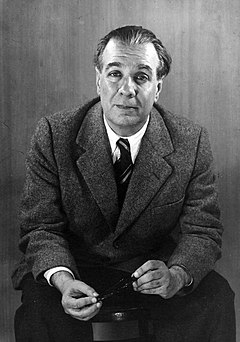| Jorge Luis Borges | |
|---|---|

Borges in 1951, by Grete Stern | |
| Born | Jorge Francisco Isidoro Luis Borges Acevedo
24 August 1899 Buenos Aires, Argentina |
| Died | 14 June 1986 (aged 86)
Geneva, Switzerland |
| Occupation | Writer, poet, critic, librarian |
| Language | Spanish |
|
| |
Jorge Francisco Isidoro Luis Borges Acevedo (August 24, 1899 – June 14, 1986), known as Jorge Luis Borges (Spanish pronunciation: [ˈxorxe ˈlwis ˈβorxes]), was an Argentine writer, essayist, poet and translator born in Buenos Aires. In 1914 his family moved to Switzerland where he attended school and traveled to Spain. On his return to Argentina in 1921, Borges began publishing his poems and essays in surrealist literary journals. He also worked as a librarian and public lecturer. In 1955 he was appointed director of the National Public Library (Biblioteca Nacional) and professor of Literature at the University of Buenos Aires. In 1961 he came to international attention when he received the first International Publishers' Prize, the Prix Formentor . In 1971 he won the Jerusalem Prize. His work was translated and published widely in the United States and in Europe. Borges himself was fluent in several languages. He died in Geneva, Switzerland, in 1986.
His work embraces the "character of unreality in all literature".[2] His most famous books, Ficciones (1944) and The Aleph (1949), are compilations of short stories interconnected by common themes such as dreams, labyrinths, libraries, animals, fictional writers, religion and God. His works have contributed to the genre of science fiction as well as the genre of magic realism, a genre that reacted against the realism/naturalism of the nineteenth century.[3][4][5] In fact, critic Angel Flores, the first to use the term, set the beginning of this movement with Borges's Historia universal de la infamia (A Universal History of Infamy) (1935).[6] Scholars also have suggested that Borges's progressive blindness helped him to create innovative literary symbols through imagination.[7] His late poems dialogue with such cultural figures as Spinoza, Camões, and Virgil.
His international fame was consolidated in the 1960s, aided by the "Latin American Boom" and the success of Gabriel García Márquez's Cien Años de Soledad (One Hundred Years of Solitude).[3] Writer and essayist J. M. Coetzee said of him: "He, more than anyone, renovated the language of fiction and thus opened the way to a remarkable generation of Spanish American novelists."[8]
Jorge Luis Borges Quotes
- Any life is made up of a single moment, the moment in which a man finds out, once and for all, who he is.
- Art always opts for the individual, the concrete; art is not Platonic.
- Democracy is an abuse of statistics.
- I cannot walk through the suburbs in the solitude of the night without thinking that the night pleases us because it suppresses idle details, just as our memory does.
- Jorge Luis Borges
- I foresee that man will resign himself each day to new abominations, and soon that only bandits and soldiers will be left.
- I have always imagined that Paradise will be a kind of library.
- Jorge Luis Borges
- I have known uncertainty: a state unknown to the Greeks.
- In general, every country has the language it deserves.
- In the order of literature, as in others, there is no act that is not the coronation of an infinite series of causes and the source of an infinite series of effects.
- Life and death have been lacking in my life.
- Life itself is a quotation.
- Like all those possessing a library, Aurelian was aware that he was guilty of not knowing his in its entirety.
- Like all writers, he measured the achievements of others by what they had accomplished, asking of them that they measure him by what he envisaged or planned.
- My undertaking is not difficult, essentially. I should only have to be immortal to carry it out.
- Nothing is built on stone; all is built on sand, but we must build as if the sand were stone.
- One concept corrupts and confuses the others. I am not speaking of the Evil whose limited sphere is ethics; I am speaking of the infinite.
- Poetry remembers that it was an oral art before it was a written art.
- Reading is an activity subsequent to writing: more resigned, more civil, more intellectual.
- Reality is not always probable, or likely.
- The central problem of novel-writing is causality.







No comments:
Post a Comment